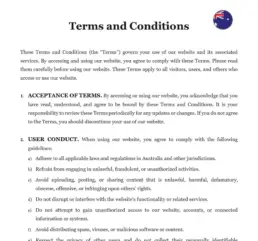Ready to use legal template
Drafted by experienced lawyers
Compliant with Australian law
Ready to use legal template
Drafted by lawyers
Compliant with Australian law
Home › Intellectual property › Terms and Conditions
Learn more about Website Terms and Conditions in Australia
Terms and Conditions, also known as Terms of Service or Terms of Use, are a set of rules and guidelines that users must agree to abide by in order to use a website, application, or service. These terms govern the relationship between the website or service provider and its users, outlining rights, responsibilities, limitations, and obligations. In Australia, Terms and Conditions often address various aspects such as user rights and responsibilities, intellectual property rights, disclaimers, limitations of liability, payment terms, and dispute resolution mechanisms.
📄 Related documents
Table of contents
What is a Terms and Conditions in Australia?
Why use a Terms and Conditions in Australia?
What should it include?
How does it protect businesses and consumers in Australia?
How does it outline intellectual property rights?
What are the consequences of non-compliance in Australia?
What if I don’t have a Terms and Conditions in Australia?
What is a Terms and Conditions in Australia?
In Australia, a Terms and Conditions (T&C) agreement is a legal document that outlines the rules, regulations, and obligations governing the use of a product or service offered by a business. It serves as a contract between the business and its customers, establishing the terms of the relationship and defining the rights and responsibilities of each party. T&C agreements are commonly used for online platforms, websites, mobile applications, and other business transactions.
Why use a Terms and Conditions in Australia?
Businesses in Australia use T&C agreements for several reasons:
1. Legal Protection:
T&C agreements provide legal protection by establishing the terms of service, usage policies, and disclaimers, which can help mitigate risks and liabilities in case of disputes or legal claims.
2. Clarity and Transparency:
T&C agreements provide legal protection by establishing the terms of service, usage policies, and disclaimers, which can help mitigate risks and liabilities in case of disputes or legal claims.
2. Clarity and Transparency:
T&C agreements communicate important information to customers regarding their rights, obligations, and expectations when using the product or service, promoting clarity and transparency in business transactions.
3. Enforcement of Policies:
T&C agreements enable businesses to enforce specific policies, such as payment terms, refund policies, intellectual property rights, and privacy practices, to ensure compliance and consistency among users.
What should it include?
A T&C agreement in Australia should include the following key components:
| ➤ Introduction: A brief overview of the agreement and its purpose, including the parties involved and the scope of the terms. |
| ➤ Acceptance: Information on how users accept the terms, such as by clicking "I agree" or continuing to use the product or service. |
| ➤ Definitions: Definitions of key terms used throughout the agreement to clarify their meanings and interpretations. |
| ➤ Usage Rights: Details on the rights and permissions granted to users, including limitations on use, intellectual property rights, and prohibited activities. |
| ➤ Payment Terms: Terms related to pricing, fees, billing cycles, and payment methods for paid products or services. |
| ➤ Refund and Cancellation Policies: Policies governing refunds, returns, exchanges, and cancellations, if applicable. |
| ➤ Disclaimers and Limitations of Liability: Statements disclaiming warranties, limiting liability, and outlining the extent of the business's responsibility for damages or losses. |
| ➤ Privacy Policy: References to the business's privacy policy, including how personal information is collected, used, and protected. |




